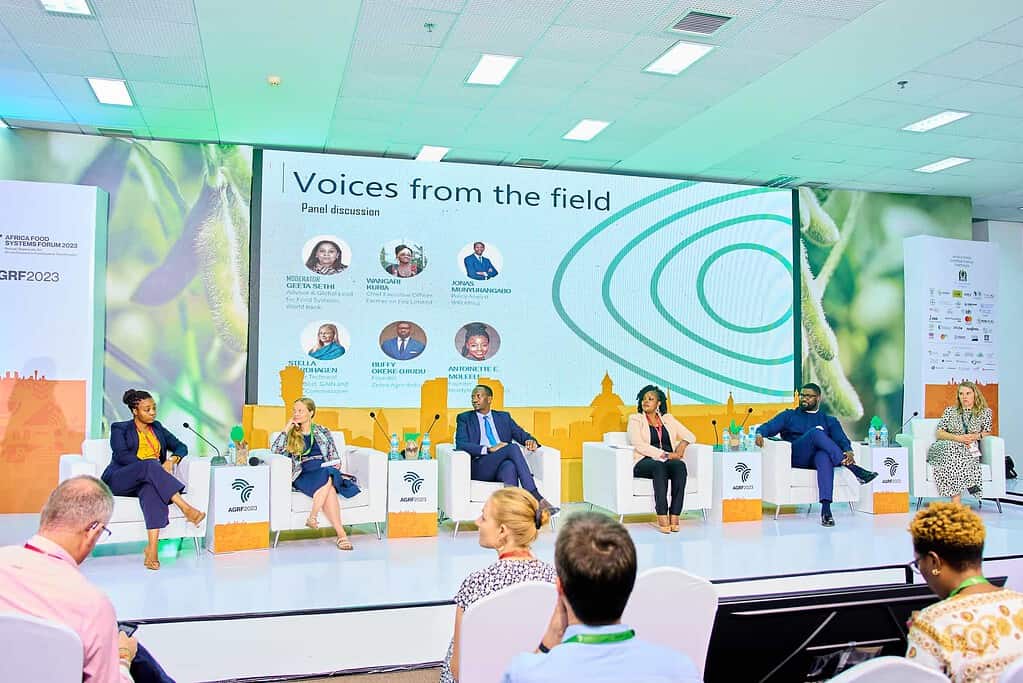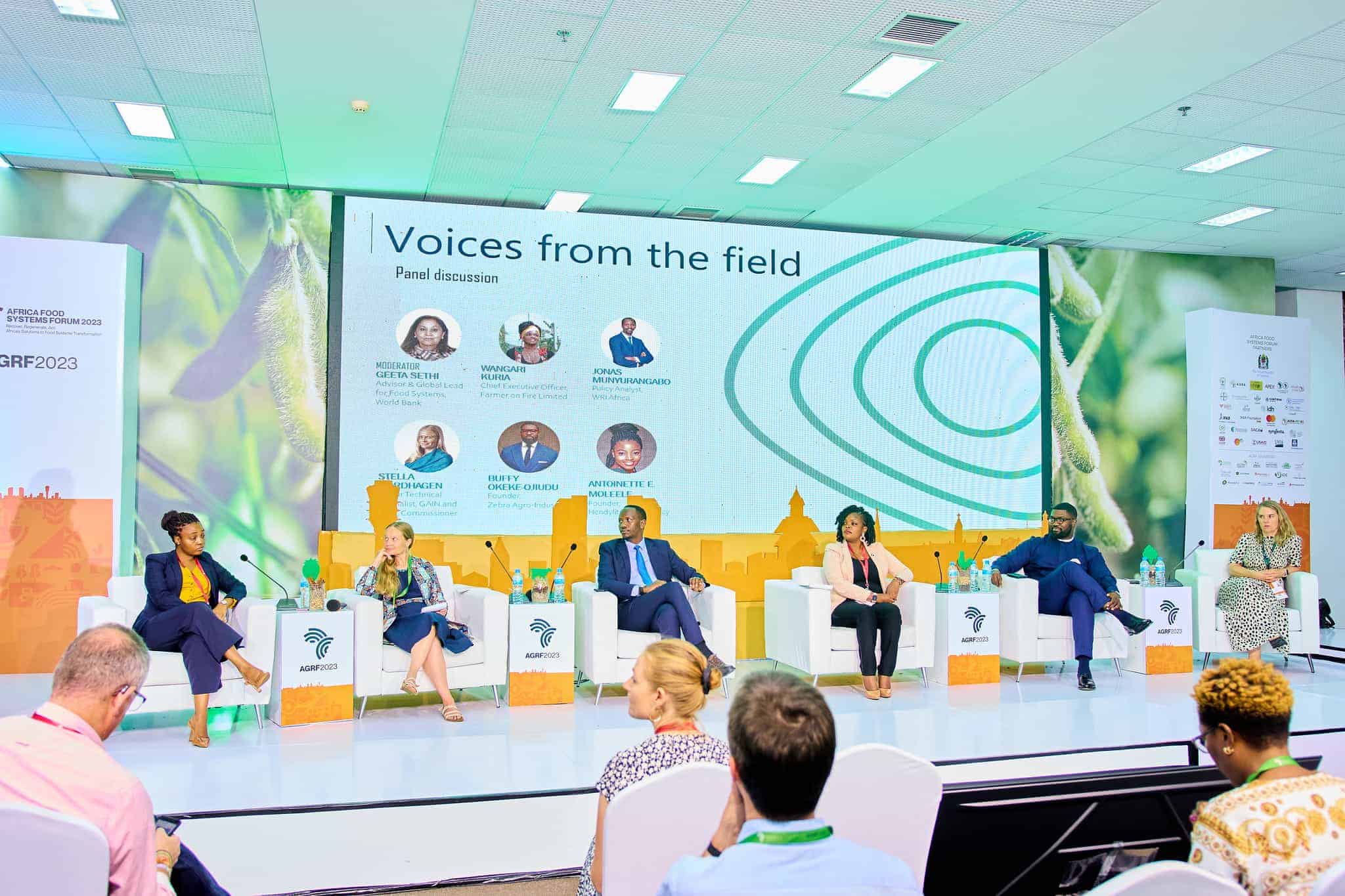Agriculture Entrepreneurs are the Backbone of African Food Systems

- Blog
- Agriculture
- East Africa
By the year 2050, Africa’s population is projected to more than double, reaching a staggering 2.4 billion people. African agriculture plays a critical role in both employment and food security of the continent — over half of sub-Saharan Africa’s employed people work in agriculture. The impacts of climate change, from rising temperatures to changing rainfall patterns, threatens agricultural productivity and the ability of the continent’s smallholder farmers to adapt.
To fuel the future, we must look towards agricultural small and medium enterprises (agri-SMEs), which serve as Africa’s primary employers and catalysts for economic growth. These agri-SMEs are pivotal in ensuring that the agriculture sector in Africa can respond to climate change and forge a path out of poverty for millions of smallholder farmers capable of feeding billions more.
This message underpinned the sessions across the 2023 Africa Food Systems Forum (AGRF) in Dar es Salaam, Tanzania in early September and continued to be at the forefront of events throughout New York Climate Week, like the 78th United Nations General Assembly and the Clinton Global Initiative’s (CGI) Annual Meeting (read about our new Commitment to Action here).
The Importance of Entrepreneurship
Acumen has always believed in the power of entrepreneurship to solve some of the world’s most pressing problems. We have positively impacted over half-a-billion lives by investing and accompanying social entrepreneurs. Throughout our 18+ years of work in agriculture, we know that entrepreneurs working with smallholder farmers are the backbone of African food systems, which is why our latest agriculture initiative – Trellis – is committing $30M to funding the agri-entrepreneurs working on the critical issues of climate resilience and food security.
Raising the visibility of Acumen-supported enterprises like WARC, Zebra CropBank, Kentaste, and EthioChicken, whose companies are creating smallholder agricultural solutions in sub-Saharan Africa, was one of our core goals of participating in the Africa Food Systems Forum. Partnering with CABI and CPI on the Climate Finance Deal Room, speaking on panels alongside Ikea Foundation, SNV, SAFIN, CGIAR, FCDO, USAID, and the World Bank, and leading conversations about climate finance and what scale means in agriculture were other highlights of the conference.
“Strengthening the long-term competitiveness of Africa’s agri-SMEs requires proactive and ongoing public-private engagements that promote adaptive practices to respond to climate change disruptions, resilience and innovation to deal with weak business environments and capacity constraints, in addition to targeted financial support and the sharing of effective and functional models that recognize the African context.”
Watipaso Mkandawire, Regional Food Market Advisor at the UK’s Foreign, Commonwealth, and Development Office (FCDO)
Here are three ways we can help to build stronger entrepreneurial solutions in agriculture:
1: Think long-term.
Tackling the long-term challenges of climate change and food security requires more than short-term policies and one-time investments. A forward-looking enabling environment that is driven by favorable government policies and long-term, flexible, patient capital are needed for agri-SMEs and entrepreneurs to succeed and transition to sustainable farming practices.
Acumen portfolio companies highlighted five key challenges across the government enabling environment, including 1) mapping and providing data on food systems and value chains to enable companies to plug in, work together, and identify gaps, 2) prioritizing investment in last mile infrastructure, 3) Forex fluctuations, availability of early-stage equity, and the increasingly high cost of debt are financing challenges, along with the the need for intermediaries – like Acumen – in order for agri-SMEs to access climate finance, 4) government partnerships to de-risk investments and prove out what works, and 5) aligning government policies with agriculture time horizons.
WARC, an Acumen portfolio company working in staple crops in Ghana, highlighted the long-term time horizons of climate change and agriculture. Governmental policy, on the other hand, has short-term time horizons aligned with political terms. There is a need to balance the short-term needs of food and agriculture with longer-term capital and time horizons.
2: Engage youth and women.
Agriculture presents a unique opportunity to engage youth and women. As the most important source of employment for women in sub-Saharan Africa, any solution in agriculture must consider engaging youth and women across the value chain.
Buffy Okeke-Ojiudu, an Acumen Fellow and CEO of Zebra CropBank, an Acumen investee, recognizes the power of youth in Nigeria across the agriculture value chain from jobs for young people at their central offices to smallholder farmers at the last mile – 60% of smallholder farmers who access their services are under the age of 35. Kentaste, also an Acumen investee, works in the coconut value chain in East Africa and is building a gender-inclusive business and understands how critical youth and women in agriculture are for a food secure future for Africa.
“Africa’s youth don’t find agriculture boring. They more often don’t have the capital or market access to get started.”
Brian Ondeng, Senior Portfolio Associate, Acumen East Africa.

3: Rethink scale.
“Scaling at all costs” is damaging to agriculture companies. Funders should recognize that scale can mean numerous things, from deepening impact to building value chains. Capital should be flexible to accommodate changing business needs and types of scale. As we’ve said before, the quality of growth and its depth of impact is often just as important as the quantity of growth.
EthioChicken, for example, has an incredible story of scale and impact. When Acumen first invested in EthioChicken in 2014, they were distributing 600,000 chickens a year in Ethiopia. They now supply over 30,000,000 chickens serving 60 million smallholder farmers in nine countries in Africa. Agribusinesses like Lizard Earth in Sierra Leone present a different, but equally important, vision of scale. With a goal to reach 5,000 farmers by the end of 2024, that’s an estimated 25% of smallholder cocoa farmers in the region with the majority – 80% – reporting a high increase in income. These are two different versions of scale that demonstrate deep impact.
Looking Forward
In the lead up to COP 28, we will continue to champion entrepreneurial solutions at the intersection of agriculture and climate. Our focus will be on ensuring food systems and agriculture are central to climate action efforts and that the voice of the smallholder farmer is clearly articulated on the global stage. If you are interested in learning more about Trellis and how to get involved please visit: thework.acumen.org/trellis.
Acumen would like to thank the UK Foreign, Commonwealth and Development Office (FCDO) for supporting Acumen’s participation in the AGRF conference and Acumen’s Trellis initiative.